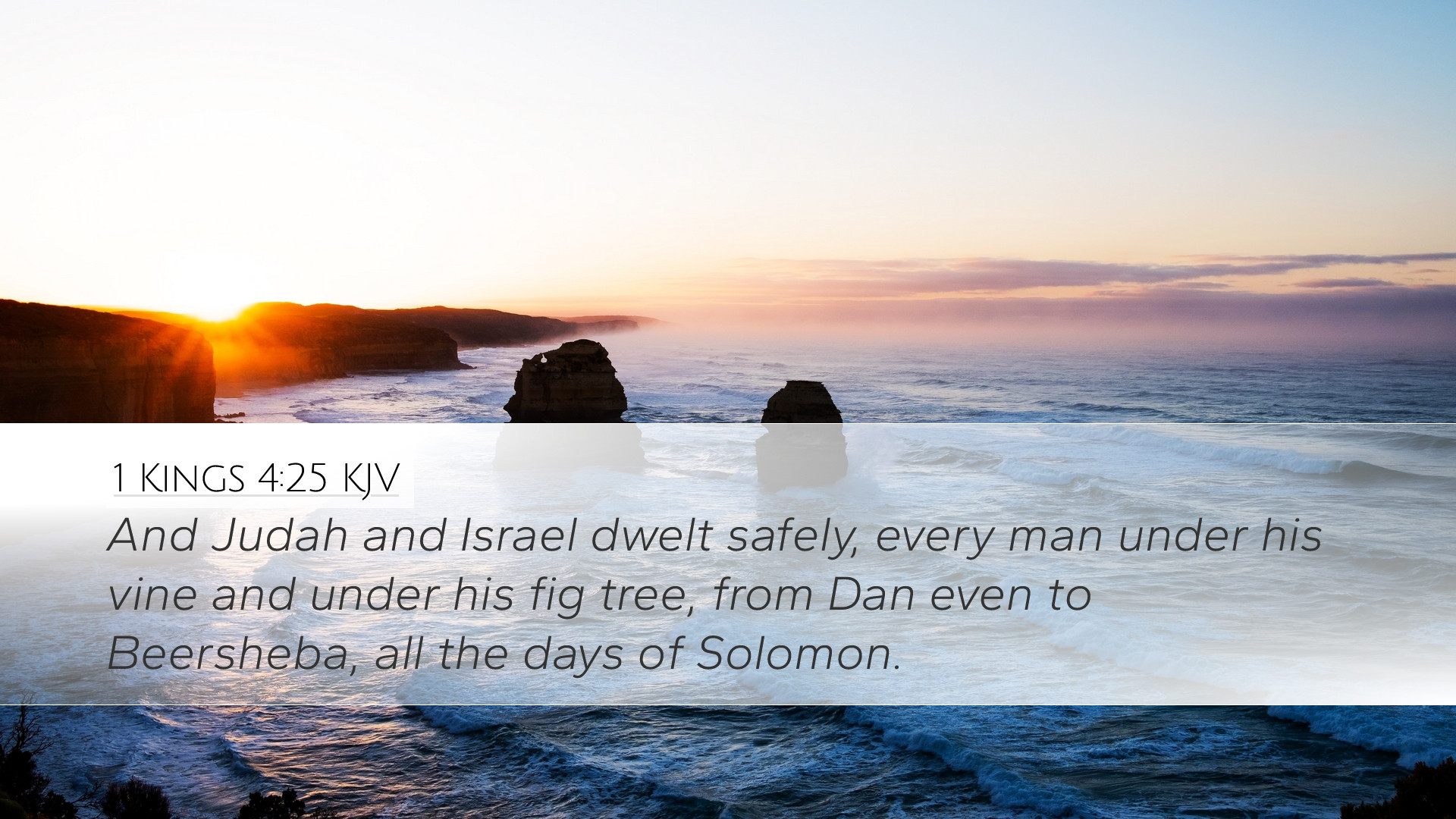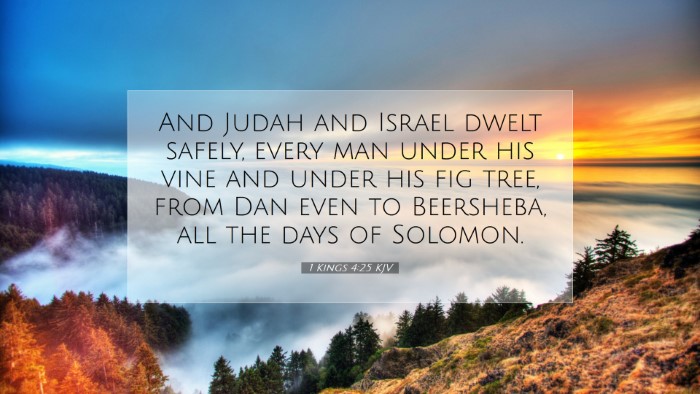Bible Commentary on 1 Kings 4:25
Verse Context: 1 Kings 4:25 states, "And Judah and Israel dwelt safely, every man under his vine and under his fig tree, from Dan even to Beersheba, all the days of Solomon." This verse captures the essence of the peace and prosperity that characterized Solomon's reign, highlighting a time of security and satisfaction for the people of Israel.
Introduction
This commentary synthesizes the insights from notable public domain commentaries, enhancing the understanding of 1 Kings 4:25. The verse serves not only as a historical account but also as a profound theological reflection on God's provision and the fulfillment of His promises to His people.
Historical Context
Solomon’s Reign: Solomon’s reign is often celebrated as the zenith of Israel's monarchy, marked by wealth, wisdom, and religious significance. According to Matthew Henry, Solomon was endowed with unparalleled wisdom which led to widespread peace.
National Security: The mention of "Judah and Israel" signifies the unity under Solomon's rule. Albert Barnes emphasizes that this unity was crucial for the national identity, setting a precedent for future generations.
Territorial Extent: The geographical reference from "Dan even to Beersheba" indicates the vastness of Solomon’s kingdom, reinforcing the security experienced by the Israelites throughout the land.
Theological Insights
This verse reflects several theological themes that are pivotal for pastors and theologians.
- Divine Peace: The security "under his vine and under his fig tree" symbolizes peace and abundance, illustrating the fulfillment of God's promise of rest from enemies (Deuteronomy 12:10). Adam Clarke notes that this signifies prosperity enjoyed in their own homes, which was a divine blessing.
- Community and Well-Being: Every man dwelling safely speaks to community welfare. It suggests social stability and individual contentment, harmonizing with the biblical principle that reflects God's desire for the holistic well-being of His people.
- Symbolism of Vine and Fig Tree: The vine and fig tree are ancient symbols of peace and prosperity in Jewish tradition. This imagery resonates deeply within the agrarian society of ancient Israel, reminding readers of the importance of agricultural life embedded in biblical economics.
Commentaries and Analysis
Matthew Henry’s Commentary
Matthew Henry emphasizes the significance of peace as a blessing from God that allows the nation to prosper. He articulates that the security of the Israelites under Solomon's rule is a testament to divine governance and the fulfillment of God’s covenant with Israel, demonstrating that when God's people walk in His ways, blessings accompany them.
Albert Barnes’ Notes on the Bible
According to Albert Barnes, the peace described in the verse reflects a time when the tribes of Israel were united, and conflicts were minimal. He points out that while the administration presented by Solomon was remarkable, the ultimate source of this peace should be attributed to God's providence and favor upon the nation. This collective tranquility is indicative of righteous leadership.
Adam Clarke’s Commentary
Clarke explains the sociopolitical dimensions of the verse, noting that the imagery utilized not only represents physical safety but also hints at spiritual security found in obedience to God. He asserts that the metaphor of "every man under his vine" suggests individual security, which contributed to a stable society.
Implications for Contemporary Faith Communities
The truths drawn from 1 Kings 4:25 hold profound implications for modern faith communities:
- Leadership and Responsibility: Pastors and church leaders are reminded of their role in promoting peace and unity within their congregations. Solomon’s wisdom serves as a model for faithful leadership.
- Community Engagement: The verse encourages modern believers to foster environments where members can experience safety and security, thus reflecting God’s kingdom on earth.
- The Call to Obedience: The prosperity seen during Solomon’s reign reinforces the biblical principle of obedience to God leading to blessing. It challenges congregations to examine their commitment to God’s ways for the experience of peace.
Conclusion
In 1 Kings 4:25, we witness a moment of great significance in Israel’s history—a time of peace, safety, and prosperity under Solomon's reign. Drawing from the insights of Matthew Henry, Albert Barnes, and Adam Clarke, we see this moment not merely as historical record but as a beacon of hope for contemporary believers. The verse invites us to reflect on God's faithfulness, the importance of righteous leadership, and the collective well-being of the community of faith.


